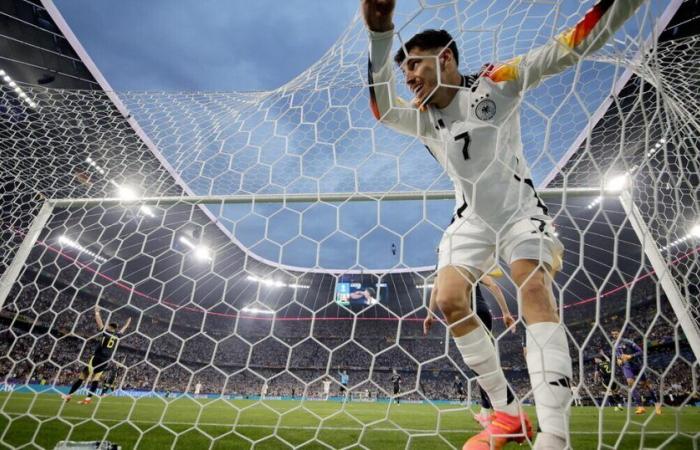Il mash, in journalistic language, is – says Treccani – a “service that reports the political events of the day together with declarations and information”. For every day of the European Championship in Germany, from the debut to the final, here will be the facts of the day. The serious ones and the not-so-serious ones. Those on the pitch, those in the stands, what’s around. This, in short, is German Mash.
The point
Germany won the first, but also a little bit of the Scots. In short, the European Championship has begun. Italy starts today, against Albania, but there are also two other matches. If you are one of those who don’t want to miss one, three matches (the others are Spain-Croatia and Hungary-Switzerland) in one day are practically the most you can afford, apart from the last two days of the group stage, in which there are there are four, but you have to choose two, because they are played at the same time. I know, there were more at the World Cup. But I shouldn’t have to explain the difference, right?
Easy, with Kross
Okay, we all expected Germany to win, but they exaggerated. They did so much that they even scored Scotland’s goal, as it ended up in Rudiger’s name on the scoresheet. But a little while ago I was saying that the Scots also won a bit: apart from because there were so many of them, because they didn’t stop celebrating for a second even if there was little to celebrate, but above all for the great joy that the Tartan Army brought on the streets of Munich, those moments that make you envy those who are around during the European Championship, while you don’t. Then, of course, the match was unbalanced: but it’s easy if Toni Kross play with you. Yesterday at least a couple of sources swear they saw him miss the first pass of the match after 66 minutes. The total count given to us by the statisticians is: 101 complete passes out of 102 made, so the sources are right, that one was wrong.
Albania as if it were Football Manager
A few weeks ago I saw my son who, while playing Football Manager, evaluated and “dialogued” with strange players. I asked him why and he replied that he was coaching the Algeria national team and that way he found eligible players for his representative team even if they were not born there. He did something like that Silvinho, coach of Albania: thanks to an algorithm he managed, from the moment he was hired (we are in January 20023), to find a series of footballers who were not Albanian by birth, but could have played for the Albanian national team and he convinced them. Today you could see on the field, for example, Ivan Billiu, professional full-back for Rayo Vallecano, Catalan son of two Catalan parents, but with an Albanian great-great-grandfather. Result? Nineteen players called up were not born in Albania. If you want another fact: none of the squad that arrived in Germany plays in the national championship. They are not the only ones: Denmark is also there, but without an algorithm.
Beautiful things about Spain-Croatia
If it were up to me, to talk about Spain-Croatia I would only talk about Modric and Yamal. They represent what I ask of football. Modric is one of the most beautiful players we have ever seen and who cares if he is almost thirty-nine years old, as long as he is on the pitch we can enjoy watching him. Yes, I know that yesterday I praised Kross because he decided to retire at thirty-four, but towards Modric I have such veneration for his class, his dedication, his discretion that the day he announces his retirement I will feel alone. Yamal, on the other hand, is that other important aspect that I take into consideration: always having the courage to let those who are talented play, even if they are very, very young. In Spain this happens much more often than elsewhere, but if you haven’t seen it enough, watch it today and you will understand why we need to let those who know how to play football very well onto the pitch, regardless of age. So, to explain: Yamal is the youngest player (at 15 years and 290 days) and goalscorer (at 16 years and 87 days) ever in La Liga, the youngest starter in the Champions League (16 years and 83 days), the most young debutant and scorer for the Spanish national team (all at 16 years and 57 days) and as soon as he enters the field he will be the youngest ever in a European Championship. He will turn 17 the day before the final, if Spain gets there.
Marco Rossi and Orban, ready for moderate parties in Switzerland
Marco Rossi, Italian coach of the Hungarian national team, he has a very big responsibility. If in Hungary the opponents of Orban they say he spends more on football (2.8 billion dollars for stadiums and infrastructure since 2010, it is estimated) than on teachers, it is clear what value the eternal (and controversial) prime minister gives to football , who would have planned the entire agenda of the next few days according to his team’s European Championship matches, which he could personally attend. Like many (but I will talk about it again), he uses football as a tool for consensus, a fundamental element in building soft power. In fact, it is focusing a lot on the result of Euro2024. If I were Rossi, I would worry about trying to please him.
They have no such worries in Switzerland. That is, they have typically Swiss concerns. For example, what happens if the national team wins and someone wants to celebrate by breaking the proverbial peace of the cantons? Here’s the answer: the Region informs us that there will be “substantial tolerance for post-match carousels”. Translated: it will be allowed to honk to celebrate up to an hour after the match, the police will only intervene in risky situations (if someone leans out of the car windows, while no bonus for being drunk) and in some city the processions could be channeled in an orderly manner. To clarify: honking as an expression of joy is prohibited by road traffic law. A southern Italian wedding would end in a raid, basically.
There is another algorithm!
No, it’s not actually an algorithm, but it seemed effective to me to play with the one made yesterday by Opta. This is the CIES statistical model, created taking into account the minutes played by the players called up, weighted with the sporting level of the matches. If you have come this far and understood who I am talking about, know that according to this competitiveness index the favorite is Germany, slightly compared to Spain. Then there are France and England, Italy is seventh. And since we are, a few more numbers: the Premier League is the championship with the most players (96), but not too far away is Serie A (91) and at least one player from the English championship is present in twenty-one twenty-four national teams. The most experienced team – not the oldest, the figure is calculated based on the appearances of its players in international tournaments – is Croatia (which has four players with over one hundred appearances), followed by Portugal and, surprisingly, Switzerland. Who knows if there will be numbers to give until the end of the European Championship. Curious, right?






